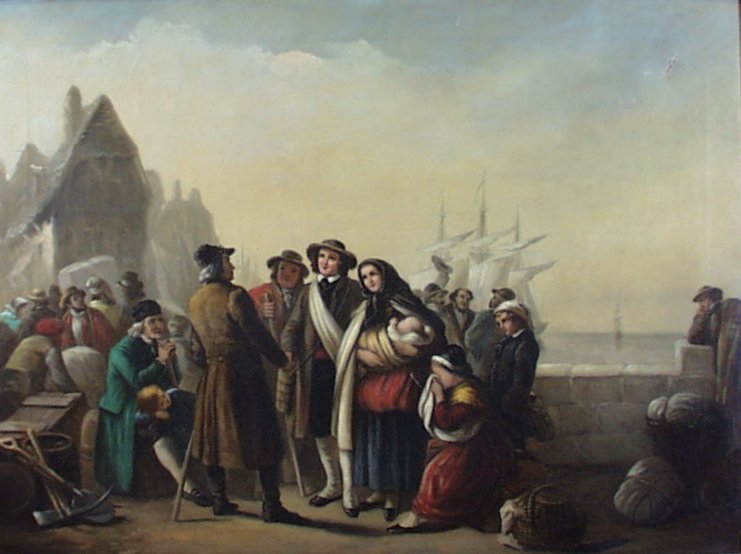
Bewerten
0de5fa56-485c-4b3e-a426-5feef75a1f47|0|.0|96d5b379-7e1d-4dac-a6ba-1e50db561b04
For nearly twenty years, from 1845 to 1866, Brake was also an emigrant harbor. Thereby, the year 1854 represented the peak with more than 7,000 passengers. The “Public House” is a witness with regard to this era. Prospective emigrants often spent weeks waiting here for the chance to set sail. During that time, facilities such as the “Public House” served them as a store or a place of dwelling. Even the local ship chandleries catered to this group of people. Indeed, the “Public House” and the ship chandleries were located beneath the same roof. In 1866, a small group of emigrants commenced the last transit from Brake into the New World. Bremerhaven had already specialized in this lucrative transport business. In 1854, more than 75,000 people were transported from Bremerhaven towards America.
Brake as a Harbor for Emigrants
 Emigrants
Emigrants
depicted on an oil painting
around 1850
Between 1845 and 1865, Brake served as a harbor for emigrants. Contrary to the situation in Hamburg, for example, which was the first station before an inevitably more expensive intermediate stopover in England, Brake and notably Bremerhaven offered direct passages across the Atlantic to America.
In 1846, some 1,979 persons left their homeland via Brake. In 1854, around 7,314 of some 100,000 people did the same. Among them, almost 76,000 travelled via Bremerhaven. In the course of the following years, the focus shifted more and more to the other side of the Weser. Ultimately, in 1866, barely 173 emigrants were shipped across the ocean via Brake.
Staying in Brake
The potential emigrants, often entire families, usually spent several weeks in Brake, until their ship was ready to sail. Due to the strong demand, the authorities established an Emigration Office in Brake. This allowed final matters to be conveniently taken care of. During the stay in Brake, facilities such as the “Public House” allowed the visitors to purchase tickets for the sea passages and to stay overnight. Even ship chandlers [LINK] could be regularly seen in or near the „Public House“. Indeed, they customized their range of products to accommodate the special needs of the ship crews and the emigrants themselves.
Involuntary Guests
The visit in Brake was occasionally extended, for example, due to necessary ship repairs. Indeed, many stories have been told of emigrants who were involuntarily stranded in Brake. The story of the “Giessen Emigrants´ Society” is perhaps the most well-known account. Some 500 persons from Hesse, Bavaria and Thuringia were hoping to be among the people breaking away towards America. Approximately half of them boarded their ship and departed at the designated time, the other half remained anchored in Brake: The ship did not arrive. At the time, the citizens of Brake were not ver hospitable, Being afraid of diseases and thieves, the residents of Brake were inclined to deport the stranded emigrants to the nearby riverine island of Harriersand.
The Island as a Waiting Room
The well-trained, somewhat fastidious emigrants leaving Brake were not particularly pleased by the conditions on Harriersand at the time. At the time of the Weser correction, Harriersand was hardly more than as sand dune in the middle of the meandering river, hardly populated and, in the eyes of the stalled travelers waiting for one or two months, the intermediate station in the open air was “a miserable cow stable”.
Experiences in the museum
Learn more about the region’s proud ships and gain an impression of the hard life aboard that aso affected emigrants. A variety of objects related to the topic are waiting to be discovered in both "Haus Borgstede & Becker" and the Telegraph. You’ll find the oil painting and the barque "Borgstede" – used as an emigrant ship – or the brig "Friedrich August" as models in the Telegraph.
You can find more information on Harriersand at the station of the same name.
Maritime Museum - Telegraph, Kaje 8, 26919 Brake - Ground floor
Maritime Museum - "Haus Borgstede & Becker", Breite Straße 9, 26919 Brake
Harriersand, Inselstraße, 28790 Schwanewede
